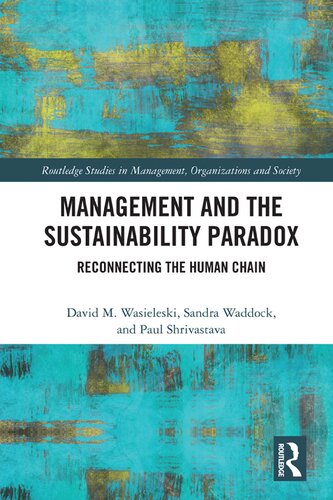

Most ebook files are in PDF format, so you can easily read them using various software such as Foxit Reader or directly on the Google Chrome browser.
Some ebook files are released by publishers in other formats such as .awz, .mobi, .epub, .fb2, etc. You may need to install specific software to read these formats on mobile/PC, such as Calibre.
Please read the tutorial at this link. https://ebooknice.com/page/post?id=faq
We offer FREE conversion to the popular formats you request; however, this may take some time. Therefore, right after payment, please email us, and we will try to provide the service as quickly as possible.
For some exceptional file formats or broken links (if any), please refrain from opening any disputes. Instead, email us first, and we will try to assist within a maximum of 6 hours.
EbookNice Team

Status:
Available0.0
0 reviewsManagement and the Sustainability Paradox is about how humans became disconnected from their ecological environment throughout evolutionary history. Begining with the premise that people have competing innate, natural drives linked to survival. Survival can be thought of in the context of long-term genetic propagation of a species, but at the same time, it involves overcoming of immediate adversities. Due to a diverse set of survival challenges facing our ancestors, natural selection often favored short-term solutions, which by consequence, muted the motivations associated with longer-range sustainability values.
Managerial decisions and choices mostly adopt a moral calculus of costs versus benefits. Managers invoke economic and corporate growth to justify virtually any action. It is this moral calculus underlying corporate behavior that needs critical examination and reformation. At the heart of it lie deep moral questions that we examine in this book, with the goal of proposing ethical solutions to the paradox.
Management and the Sustainability Paradox examines the issue that there appears to be an inherent paradox between what some businesses view as "a need for progress" and " a concern for sustainability". In business, we often see a collision between ideas of progress and sustainability which shapes corporate actions, and managerial decisions. Typical corporate views of progress involve the creation of wealth, jobs, innovative products, and social philanthropic projects. On the basis of these "progressive" actions they justify their inequitable distribution of surpluses by paying low wages and exploiting ecological resources. It is not difficult to see the antagonistic interplay between technological and social innovation with our values for social and environmental well-being and a dualism that needs to be overcome.
This book is intended for a broad appeal to an academic and policy maker audience in the sustainability and management fields. The book will be of vital reading for managers seeking to reconnect our human chain with the natural environment in the cause of sustainable business.